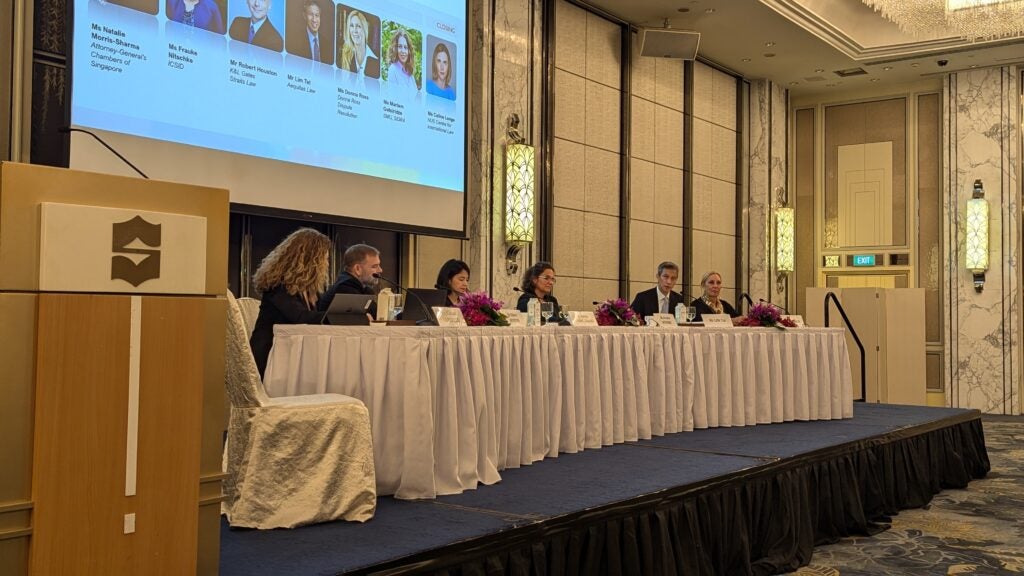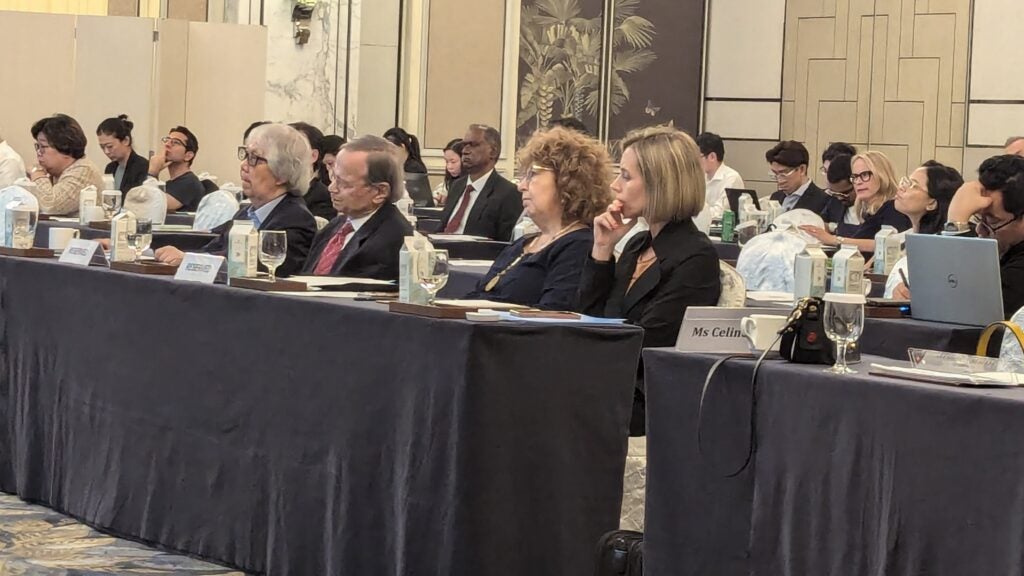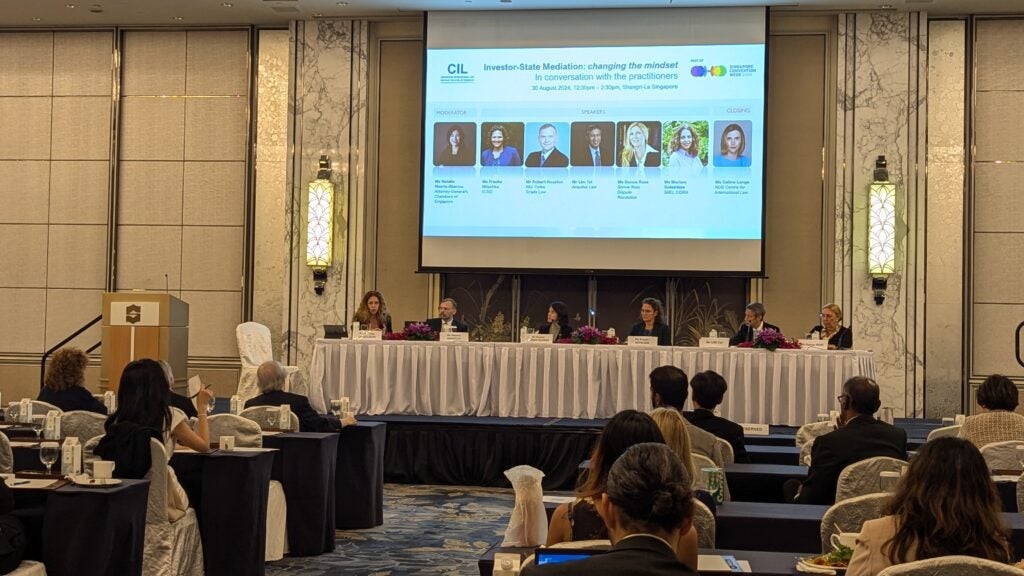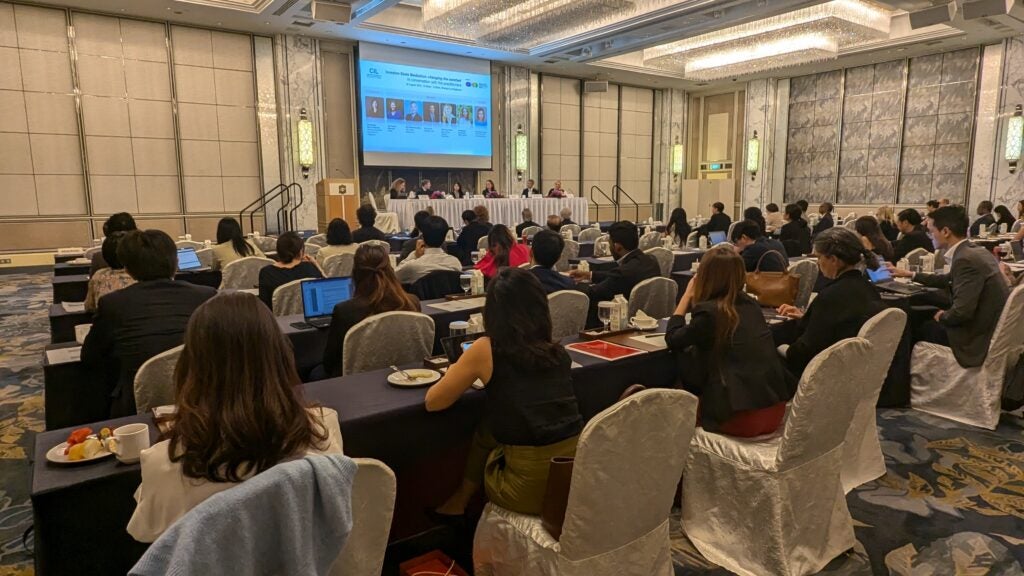Venue
Start
End
Time
Investor-State Mediation: changing the mindset –
In conversation with the practitioners
On 30 August 2024, a conference entitled “Investor-State Mediation: changing the mindset – In conversation with the practitioners” was organized by CIL’s International Dispute Resolution Programme, in conjunction with Singapore Convention Week 2024.* The Singapore Convention Week, organised by Singapore’s Ministry of Law, is an annual event dedicated to dispute resolution, encompassing arbitration, mediation and litigation.
The objective of the CIL conference was to bring together experienced practitioners to discuss how, in the very specific context of disputes involving States and foreign investors (“Investors”), to advance a tailored approach to dispute settlement, doing away with an automatic and exclusive recourse to arbitration.
The panel was moderated by Natalie Morris-Sharma, Legal counsel at the Attorney-General’s Chambers of Singapore where Ms Morris-Sharma advises and represents the Government on international law issues.
Introductory remarks were provided by Celine Lange, Development Lead, CIL’s International Dispute Resolution Programme, and concluding remarks by Dr Nilufer Oral, Director of CIL.
Introduction
- Investor-States disputes are predominantly resolved by the exclusive recourse to arbitration, but mediation has been gaining traction, and Investor-State disputes do settle
Arbitration is the preferred method of dispute resolution for disputes between Investors and States. It is the dispute resolution mechanism provided for in most International Investment Agreements (IIAs). The dispute resolution clauses in IIAs also typically provide for a “cooling off” period during which consultations or mediation can be attempted. However, while many IIAs mention or encourage it, almost none of them subject parties to compulsory consultations, negotiations, or mediation/conciliation (see Overview of Investment Treaty Clauses on Mediation, ICSID, July 2021).
In the recently released SIDRA International Dispute Resolution Survey 2024, which focuses exclusively on the users of dispute resolution mechanisms, only 11% of the participants responded that mediation was their most commonly used method of dispute resolution for Investor-State disputes. Arbitration appears dominant (95% of participants used institutional arbitration), and very seldom used in conjunction with mediation (only 5% of participants indicate that they used hybrid methods of dispute resolution). Nevertheless, 74% of respondents indicated a willingness to further engage in hybrid methods – page 82 of the SIDRA Survey.
Yet, Investor-State disputes do settle: UNCTAD World Investment Report 2024 - page 31 - indicates that 18% of known ISDS cases were settled between 1987 and 2023. However, information is not available on the way they were settled, for instance if mediation or conciliation were used. ICSID statistics provide the number of ICSID cases where conciliation was used (13 to date), but data are not available for mediation, which may or may not have been used in the “Disputes settled or proceedings otherwise discontinued” category – see ICSID Caseload Statistics 2024- 2. There are consequently information gaps on mediation in Investor-State cases, partly for reasons of confidentiality, and therefore there are not many success stories to share in order to encourage the use of Alternative Dispute Resolution (ADR) methods.
Mediation has, nevertheless, gained traction as it has been increasingly discussed and encouraged over the past few years, predominantly for commercial cases, but also for ISDS cases. Increasing guidance and new tools are available in that respect, including the 2022 ICSID Mediation Rules, the 2023 Draft UNCITRAL guidelines on investment mediation, and the 2019 Singapore Convention on Mediation, applicable to both commercial and investment cases.
- Investor-State disputes come with specific concerns and “mindset” plays a crucial role
It is however important to remember that Investor-State cases come with specificities, because one of the parties to the dispute is a State. In 2018, CIL conducted a survey on Obstacles to the Settlement of Investor State Disputes, which found that the most significant obstacle to settlement is the desire of parties to defer the decision-making responsibility to a third-party, typically a tribunal, rather than engaging in a voluntary resolution process led by them. It is especially the case on the government’s part because of various concerns specific to States: fear of public criticism, fear of corruption allegations, difficulties related to the structure of the State, with multiple agencies etc.
These fears indicate that the discussion on the use of ADR for Investor-State disputes needs to take into account the mindset of the actors involved in these disputes and their resolution, and how this mindset might play against the use of non-adversarial processes. Detailed dispute resolution clauses that are seen in modern IIAs to encourage the use of ADR methods will prove useless if misconceptions, concerns and habits prevent these actors from even considering ADR.
Panellists’ discussion
Mariam Gotsiridze, who was for 10 years a Head of Department in the Ministry of Justice in Georgia where she was representing the State in international arbitrations, brought the Government’s perspective to the discussion, and shared ways to support the engagement of government officials in the use of ADR methods. She highlighted the importance of structures promoting transparency and accountability, and the related role of financial planning, joint government bodies for decision-making and the relevance of experts.
Frauke Nitschke, Senior Counsel / Team Leader at ICSID, who has been leading ICSID’s Investor-State mediation activities, shared her institutional perspective. She explained why ICSID decided to offer mediation in addition to conciliation (available since1967), and how the 2022 ICSID Mediation Rules were closely related to the adoption of the Singapore Convention on Mediation. She also shared, inter alia, how parties’ concerns towards ADR mechanisms can be alleviated by the intermediary role of ICSID, for instance through the transmission of the offer to mediate to the other party.
Lim Tat spoke from the mediator’s perspective and emphasized the multiplicity of qualities that a mediator needs in order to deal with mediations involving States: a training in international law and alternative dispute resolution, as well as a high level of emotional and cultural intelligence –culture of various geographies and types of organisations. He also insisted on the importance for counsel to proceed at the outset to a deliberate design of the dispute process, including the possible use of early assessment. Discussions on hybrid mechanisms and the modalities to engage stakeholders such as affected communities would also be part of this design process.
The crucial role of counsel as advocates of the appropriate method of dispute resolution was also highlighted by Robert Houston. He emphasized the need for counsel to take a step back and pursue a true client-oriented approach rather than a race to arbitration, and called for a re-definition of what constitutes a “win” in the resolution of a dispute. In this holistic approach to lawyering, counsel actively identifies the underlying needs of their clients, beyond the limited scope of engagement. In line with this call for holistic lawyering (Robin G. Steinberg), Donna Ross, who teaches students of the NUS Graduate Certificate in International Arbitration & Dispute Resolution, insisted on the importance of the type of dispute resolution education provided to young lawyer. She emphasized that the discussed change of mindset requires ADR methods to be taught to law students on the same level as arbitration, an endeavor going well beyond simply raising awareness. Training efforts should not be limited to future counsel but also to future civil servants in order to address the general unfamiliarity with ADR processes, concerns and possible mistrust in these methods.
The discussion concluded on the determining role arbitrators can play in opening the mediation door at the outset of an arbitration, keeping it open throughout the process and making sure parties remember that this door is open at all times.
* CIL’s 2023 SCW partner event was an online webinar entitled “Getting the Most Out of the Singapore Convention in Investor-State Disputes”
PRE-EVENT
Registration is closed as the event is over-subscribed.
~ In conjunction with the Singapore Convention Week 2024 ~
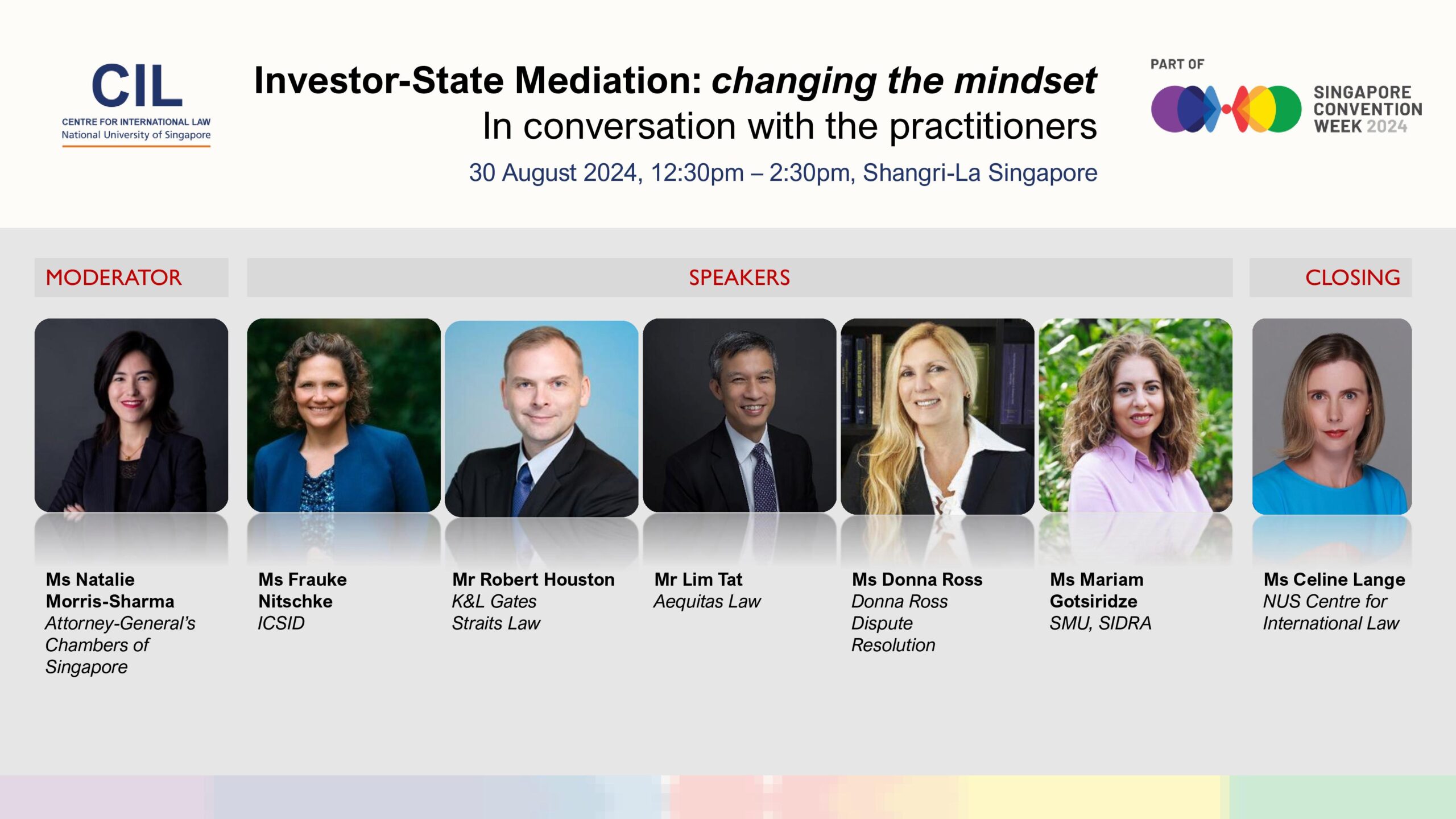
All the actors engaged in dispute resolution have a crucial role to play in the choice of an appropriate avenue, including mediation and hybrid processes, to resolve each individual dispute. In the very specific context of disputes involving States and foreign investors, how can these actors, in their practice, work towards a tailored approach, far from an automatic and exclusive recourse to arbitration? Counsel, mediation practitioners, government officials, arbitrators, academics and educators will share their experience in that regard, and possible solutions to concretely raise awareness, address concerns and change mindsets across the board.
It is increasingly recognised that non-adjudicatory methods of dispute resolution can bring many benefits: they are less costly and time consuming, allow for creative non-legal solutions, show high compliance rates, and can help preserve relationships. However, in practice, these methods are often perceived as “soft”, and associated with various obstacles and insufficient incentives for dispute actors. A CIL survey on the obstacles to the settlement of Investor-State disputes found that the most significant hurdle to settlement is parties’ desire to defer responsibility for decision-making to a third-party, typically arbitral tribunals. In the experience of dispute resolution practitioners, stakeholders’ unfamiliarity with alternative dispute resolution methods also significantly limits the use of non-adversarial processes.
Against this background, questions for the panellists will include: How can parties be encouraged to confidently consider alternative dispute resolution methods and truly engage? How can arbitrators be pro-active and support settlement efforts?; Are tribunals and counsel well-equipped to manage hybrid processes?; How can counsel, with their clients’ best interest in mind, be settlement advocates?; How can States, when considering alternative dispute resolution, navigate the multiplicity of agencies and ministries involved, as well as political pressure?; How can arbitrators, mediators, counsel and parties be open and creative in the pursuit of the appropriate dispute resolution avenue for every dispute?
These questions will be discussed by a panel of experienced practitioners, including :
- Ms Frauke Nitschke, Team Leader/Senior Legal Counsel, ICSID
- Mr Robert Houston, Senior Associate, K&L Gates Straits Law
- Mr Lim Tat, Managing Partner, Aequitas Law
- Ms Donna Ross, Principal of Donna Ross Dispute Resolution, and Adjunct Professor for NUS Graduate Certificate in International Arbitration & Dispute Resolution
- Ms Mariam Gotsiridze, Principal Research Fellow, SMU, SIDRA (Singapore International Dispute Resolution Academy), and former Head of Department in the Ministry of Justice in Georgia
The panel will be moderated by Ms Natalie Morris Sharma, Government legal counsel, Attorney-General’s Chambers of Singapore, and concluding comments will be made by Ms Celine Lange, Development Lead for CIL’s International Dispute Resolution programme.
PROGRAMME
11.45am – 12:30pm | Registration + Light Lunch
12:30pm – 12:35pm | Opening Address
12:35pm – 02:00pm | Insights by Practitioners
02:00pm – 02:30pm | Q & A, moderated by Natalie Morris Sharma
The Singapore Convention Week (SC Week), organised by the Singapore Ministry of Law (MinLaw), in partnership with various organisations, is a premier event in Singapore dedicated to dispute resolution, encompassing arbitration, mediation and litigation.
Scheduled for 26 August to 30 August 2024, this year’s SC Week promises an engaging line-up of events and serves as a vital platform for thought leaders, practitioners, policymakers and experts to explore emerging trends, tackle common challenges, discuss innovative approaches and foster change.
A highlight of the SC Week 2024 is the UNCITRAL Academy Conference and Capacity-Building Workshops hosted by MinLaw and the United Nations Commission on International Trade Law (UNCITRAL).
Visit www.singaporeconventionweek.sg to find out more.
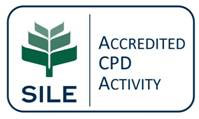 1.5 Public CPD Point
1.5 Public CPD Point
Practice Area: Alternative Dispute Resolution
Training Category: General
Participants who wish to obtain CPD Points are reminded that they must comply strictly with the Attendance Policy set out in the CPD Guidelines. For this activity, this includes signing in on arrival and signing out at the conclusion of the activity in the manner required by the organiser, and not being absent from the entire activity for more than 15 minutes. Participants who do not comply with the Attendance Policy will not be able to obtain CPD Points for attending the activity. Please refer to http://www.sileCPDcentre.sg for more information.
REGISTRATION
Registration is closed as the event is over-subscribed.


